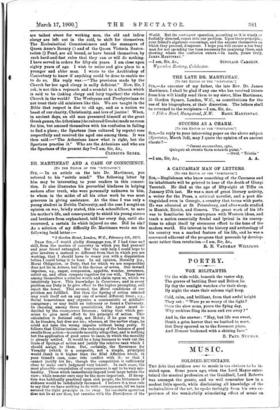DR. MARTINEAU AND A CASE OF CONSCIENCE. [To THE EDITOR
OF ins "Spturirort."] Sin, — In an article on the late Dr. Martineau, you referred to his " subtle mind." The following letter by him may be interesting to your readers in this connec- tion. It also illustrates his proverbial kindness in helping seekers after truth, who were personally unknown to him, to whom in the midst of all his other work he was most generous in giving assistance. At the time I was only a young student in Dublin University, and the case I sought an opinion on wag, briefly stated, this :—A schoolfellow, to save his mother's life, and consequently to shield his young sisters and brothers from orphanhood, told her every day, until she recovered, a certain lie which injured no one. Did he sin ? As a solution of my difficulty Dr. Martineau wrote me the following lucid letter :— "5 Gordon Street, London, W.C., February 6th, 187.9.
Deem SIR,—I would gladly disengage you, if I had time and skill, from the meshes of casuistry in which you find yourself and your friend entangled. • But the only help I could hope to give' involves a metnod so different from that in which you are working, that I should have to weary you with a disquisition before I could bring it to bear. In my opinion, Morality (i.e., Moral Obligation, or Duty, that for which we are responsible) does not lie in Actions, but in the Springs of action. Our inward impulses, e.g., anger, compassion, appetite, wonder, reverence, solicit us, and often compete together for our will, These have among themselves a relative worth and claim upon us, which we intuitively know. This knowledge is Conscience; and in every problem our Duty is to give effect to the higher prompting, and reject the lower. This secured, the Moral conditions of our problem are fulfilled. But then the Spring of action selected may work itself out on any one of several different lines ; e.g., Social benevolence may organise a communistic or nihilistic conspiracy ; or may build an infirmary or found a University. In choosing among these possibilities, the Agent must be decided by the consequences foreseen ; taking that which pro- mises to give most effect to his principle of action. This calculation is Rational only, not Moral ; if he goes wrong in it, he blunders, but does not sin ; -whereas, at the earlier stage, lie could not take the wrong impulse without being guilty. It follows that Utilitarianism—the reckoning of the balance of good results from action—is outside morality altogether, and is nothing but the application of good sense to cases, in which the morality is already settled. It would be a long business to work out the Scale of Springs of action and justify the relative rank which I should assign to them. But, certainly, the Reverence for Veracity (which is a composite, not a simple, principle) would stand in it higher than the filial Affection which, in your friend's case, came into conflict with it : so that I cannot justify his lie ; though the competition is sufficiently close to make one's judgment very lenient. In such cases, the most plausible computation of consequences is apt to be very mis- leading. Those which immediately impend loom large before the view ; while remoter ones may be the more important. If decep- tion was habitually practised upon sick people, the bitterness of sickness would be indefinitely increased. I believe it a true rule to say that we have nothing to do with consequences, till we have secured the right principle in its sway. Its inevitable operation does not lie at our door, but remains with the Providence of the World. But its contingent operation, according as it is wisely or foolishly directed, comes into our problem. Upon these principle.:, your friend's algebraic reasonings, and the axioms themselves on which they proceed, disapnear. I hope you will excuse a too busy man for not spending the time necessary for analysing them, and showing where the confusion enters.—In haste, yours truly,
JAILES M.ARTINIAU."
—I am, Sir, &e., SINCLAIR CA.1101.IN.
Wycemhce Rectory, Colchester.
































 Previous page
Previous page